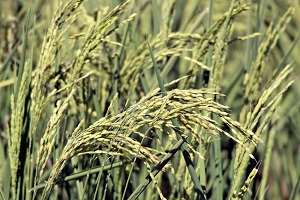Contestants in California's rice growing region have worked all summer, and now researchers are harvesting designated plots to be entered into the 2016 UC Cooperative Extension Rice Yield Contest. The contest is in its second year, following a pilot contest in 2015 that included only Butte County farmers.
The contest is held largely for educational purposes, said organizer Bruce Linquist, UCCE specialist based at UC Davis.
“We are providing an opportunity for rice producers and UC scientists to share information about intensive rice production in California,” Linquist said. “We started small last year to be sure our contest wouldn't interfere with the farmers' harvest, and now our contest spans the entire Sacramento Valley.”

Among the five 2015 entrants, farmer Joe Richter came in first, growing variety M-205 and raking in 6.3 tons of rice per acre. Farmer Rodney Jenkins came in second with 5.7 tons per acre growing variety M-206.
The UCCE Rice Yield Contest is modeled after the National Corn Yield Contest, which goes back more than 50 years. The National Corn Growers Association created the contest as a way to encourage advances and new approaches in corn production, and then sharing what is learned on farmer's plots with growers across the country.
Linquist said he believes rice farmers in the contest might try a new approach to boost yield on the contest plot, and if successful, apply it to the rest of the farm in the future. The participating growers are required to share basic crop management information such as variety, planting date, seeding rate, water management; while other practices are asked for but not required.
Yields in the pilot study were high for all the contestants, Linquist said.
“This process gives you an upper limit,” Linquist said. “The information is helpful for sustainable intensification – increasing yields without impacting the environmental footprint.”
The prize for the highest yield was modest in 2015 – a hat and custom engraved hunting knife. But if the UCCE Rice Yield Contest takes off like the National Corn Yield Contest, interest could grow.
“For rice, right now it's more about bragging rights,” Linquist said. “What we'd like to do is get the industry involved. Winning the corn yield contest is a really big deal. The organizers give out a trophy, and the industry gives vacations, small tractors and other prizes.”
Source: ucanr.edu